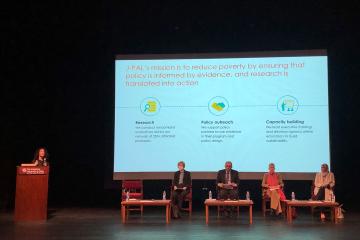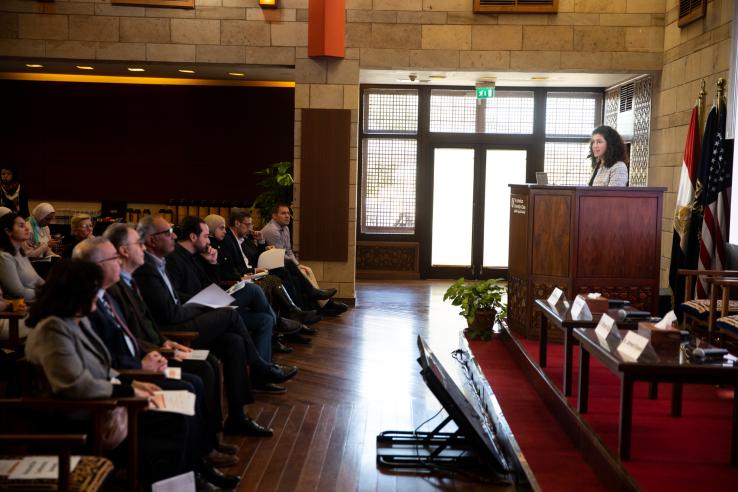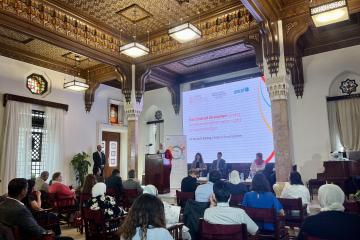
Using evidence to inform decision-making: a recap from the Global Evidence for Egypt conference

Less than three percent of J-PAL’s global evidence base comes from the Middle East and North Africa. As such, there is a pressing need to partner with researchers, government agencies, and development actors in Egypt to generate locally grounded evidence on which approaches are effective in achieving national development goals.
J-PAL Middle East and North Africa (J-PAL MENA) at The American University in Cairo (AUC) and UNICEF Egypt co-hosted a conference (recording here) on January 15, 2023 to identify opportunities for evidence to inform poverty reduction efforts in Egypt. This conference, supported by Allianz, was part of the Global Evidence for Egypt Spotlight Seminar Series which uses rigorous evidence to facilitate dialogues between Egyptian policymakers, development practitioners, and J-PAL affiliated professors on timely policy priorities in Egypt.
The first panel focused on evidence generation and use, featuring a presentation from Dr. Ahmed ElSayed, Research Associate Professor at AUC and Director of Research at J-PAL MENA; followed by remarks from Dr. Reham Rizk, Head of Social Planning and Development Unit at the Ministry of Planning and Economic Development (MPED), and Dr. Atef El-Shabrawi, Advisor to the Minister of Social Solidarity.
The second panel focused on women’s empowerment and human capital development, featuring a presentation from Dr. Bruno Crépon, Co-Scientific Director of J-PAL MENA and Professor at ENSAE and Institut Polytechnique de Paris; followed by remarks from Ms. Somaya El Alfy, Head of the Central Department for Planning and Follow-Up at the National Council for Childhood and Motherhood (NCCM), and Dr. Amira Tawadros, Director of the Demographic Center in Cairo and Coordinator of the National Family Development Program at MPED.
The third panel focused on financial inclusion and rural development, featuring a presentation from Dr. Jeremy Magruder, Professor at the University of California, Berkeley; followed by remarks from Dr. Gamel Helmy, Assistant Minister for Monitoring Affairs at MPED, and Eng. Tarek Shash, Deputy Executive Director and Head of Planning and International Cooperation at the Micro, Small, and Medium Enterprises Development Agency (MSMEDA).
The conference also included remarks from Dr. Ahmad Dallal, President of the American University in Cairo; and was moderated by Dr. Luigi Peter Ragno, Social Policy Chief at UNICEF, and Alison Fahey, Executive Director of J-PAL MENA at AUC.
Panelists discussed how rigorous evidence from randomized evaluations conducted globally can help advance policy and development priorities in Egypt, along with identifying areas where evidence generation and use can inform the design and delivery of social programs implemented by the Government of Egypt.
Generating and using evidence to inform policymaking in Egypt
Evidence generated from impact evaluations can inform many aspects of decision-making. In his presentation, Dr. ElSayed explained that there are several pathways for evidence to influence policy and practice. Adapting and scaling programs and scaling up an evaluated pilot are two possible ways J-PAL MENA at AUC can work with partners to address policy priorities in Egypt and the region.
One example of a program that has been adapted from Bangladesh and piloted in Egypt is the “Graduation Approach,” which J-PAL MENA has partnered with the Sawiris Foundation for Social Development and local NGOs to design, implement, and evaluate. Known as Bab Amal, the program targets 2,400 extreme poor households in Assiut and Sohag governorates.
During her remarks, Dr. Rizk spoke about the Egypt Impact Lab (EIL)—a lab embedded within the Ministry of Planning and Economic Development—and highlighted the importance of evidence from randomized evaluations launched under EIL in promoting a culture of evidence-based policy making in Egypt. Dr. Rizk explained that the Lab’s strategic government partners determined its thematic areas of focus, flagging which programs to target for evaluation based on national policy priorities.
Dr. El-Shabrawi then added that determining the large-scale effectiveness of programs is challenging, highlighting that although many pilots in Egypt are successful, issues arise when scaling up nationally. Giving an example from Forsa, an economic development program, he emphasized that researchers should be cautious to not dismiss the voices of beneficiaries. He concluded by emphasizing the Ministry of Social Solidarity’s keenness to partner with evidence generating research organizations.
Applying lessons from randomized evaluations on human capital development and women’s empowerment to Egypt
Gender equality is a fundamental human right and important for sustainable development. In 2022, MENA had the second largest gender gap to close, after South Asia. In Egypt, women spend 9.5 hours on unpaid household chores for every hour spent by men, 18.6 percent of women participate in the labor force, and one in four women have experienced physical and/or sexual intimate partner violence. Dr. Crépon shared some takeaways from the gender sector evidence base and discussed their applicability to Egypt.
Evidence from India, Ghana, Sri Lanka, and Uganda suggests that regardless of whether or not gender dynamics were considered in programs or research designs, they may end up playing a meaningful role in moderating or even blocking the intended impacts aimed at increasing women’s agency.
Some interventions to change attitudes toward gender norms have been tested and found to be effective. In India, classroom discussions improved gender attitudes among adolescents. In Saudi Arabia, providing information corrected misperceptions of social norms and improved men’s attitudes toward women’s employment. In Burkina Faso, Nigeria, and rural Uganda, mass media campaigns shifted attitudes and reduced misconceptions around family planning and gender-based violence. Similarly, evidence from India and the Dominican Republic suggests that increasing educational and economic opportunities, building skills, and improving expectations for girls and young women can change their career aspirations and lead to delays in marriage and childbearing.
Some of these interventions can be adapted to the Egyptian context and tested. In Egypt, social and gender norms may constrain program impacts, making it important to evaluate and possibly rethink program designs in light of the influence of norms. For example, introducing gender-focused classroom discussions among adolescents to school curriculums and using the media to drive attitude shifts can be effective, but implementation details matter. Overall, recognizing the inequality of care work distribution and shifting norms are important to improving female labor force participation, advancing gender equality, and promoting family development in Egypt.
Ms. El Alfy highlighted the role of NCCM in advancing gender equality and girls' empowerment in Egypt through initiatives like Dawwie, which has reached girls in 20 governorates with interventions aimed at improving girls’ agency. The initiative also includes messaging that targets girls’ families as well as men and adolescent boys. Ms. El Alfy emphasized the importance of intergenerational dialogues and addressing female genital mutilation and child marriage, among other issues, in attempts to shift norms and empower girls and women in Egypt.
Dr. Tawadros then reflected on how evidence can be incorporated in the implementation of the National Project for the Development of the Egyptian Family, emphasizing the role that women’s economic empowerment, increasing the supply and demand for contraceptives, and cultural awareness to correct misconceptions can play in promoting family planning and development. Dr. Tawadros underscored that the government perceives curbing the population growth rate from a developmental perspective as a strategy to ensure children’s access to adequate education, health, and employment services, and to improve living standards for all Egyptians.
Applying lessons from randomized evaluations on financial inclusion and rural development to Egypt
Access to finance can support development and poverty alleviation. In Egypt, financial inclusion rates remain low, especially among people living in rural areas and among women. Although bank account ownership increased from 10 percent to 27 percent of adults in the past decade, Egypt remains among the seven economies home to more than half of the unbanked worldwide, with women occupying more than half of the unbanked population. Dr. Magruder shared some takeaways from J-PAL’s evidence base and discussed their applicability to Egypt.
Tailoring credit design, timing offers, and addressing risk factors can help identify and meet the needs of target beneficiaries and promote take-up. Evidence from Zambia, Mali, and Kenya suggests that tailoring financial products to agricultural contexts can improve program take-up and increase agricultural outputs. Evidence from Morocco and Niger suggests that training and awareness raising campaigns can promote using credit to adopt technology and increase take-up. In Mexico and Nigcaragua, researchers find that government support to infrastructure can encourage private investment in housing and farming activities.
Researchers have found that digitization can have an impact on take up, efficiency, and women’s financial inclusion. Evidence from Uganda and Kenya shows that digitizing credit can allow women greater control over allocating their funding; while evidence from Niger and India indicates that digitizing government transfers can reduce leakages and increase overall impacts on income.
In Egypt, innovations in financial product design can benefit the agriculture sector and encourage farmers to invest in improved inputs and technologies. Linking financial inclusion to the Egyptian government’s developmental efforts in rural areas and upgrading infrastructure can increase the impact of these initiatives.
Dr. Helmy shared his insights on the Decent Life Initiative, a national project for rural development which targets 60 percent of the total population in Egypt, and expressed the importance of evidence in guiding the project’s unraveling and the need to generate lessons learned from implementation. He also discussed the “Green Village Initiative,” highlighting the government’s holistic approach to tackling economic, social, and environmental development.
Eng. Shash illustrated how MSMEDA uses evidence to promote financial inclusion, specifically to tailor and segment their customer base, explaining how MSMEDA coordinates efforts to develop micro, small, and medium enterprises via different financial products. Recognizing the importance of targeting female micro-entrepreneurs, he elaborated on the different training offered prior to receiving a loan and the need to assess the impact of such efforts prior to scaling up.
The conference made clear both the need and appetite for greater evidence use and generation in Egypt. Ultimately, building partnerships to advance a culture of evidence-based decision-making, and to complement the expertise and deep knowledge of government and development actors in Egypt, is central to alleviating poverty and progressing on national sustainable development goals.
J-PAL MENA at AUC will continue to engage policymakers, development practitioners, and J-PAL affiliated professors in discussions on priority issues and development challenges in Egypt as part of its Global Evidence for Egypt Spotlight Seminar Series with UNICEF Egypt. Register for email updates by subscribing to J-PAL MENA’s Newsletter and follow our accounts on Twitter, Facebook, and LinkedIn to find out about future events and seminars.
Related Content

Promoting healthy behaviors and family planning in Egypt: A recap from the Global Evidence for Egypt Spotlight Seminar
UNICEF Egypt holds seminar on early childhood development



